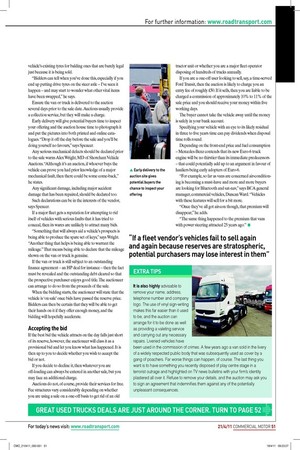Going once, going twice
Page 42

Page 43

If you've noticed an error in this article please click here to report it so we can fix it.
If you are looking to use the auctions to sell your rolling stock, here is a guide to making sure you get your just desserts
Words: Steve Banner Selling through an auction can be a quick, clean and relatively pain-free means of disposing of your time-served vans and trucks.
While they may not fetch the money you might make if you retailed them privately, leaving disposal in the hands of professional auctioneers is less time-consuming, and a lot less hassle. That, of course, presupposes that you have no plans to set up your own retail operation and run it as a stand-alone business.
If you have decided to rely on the auctions, then you must do some preparation. One of the irst things you should do is put together all the paperwork that needs to accompany the vehicle destined to go under the hammer.
That means everything from the registration documents and a current test certiicate, if applicable – hopefully with a few months still to run – to a full service history.
Gaps in the documentation could mean that your vehicle will fetch several hundred pounds less than you expected. It might not sell at all if the gaps are extensive.
“Take advice from the auctioneer on the reserve price you should set,” says Tim Spencer, regional commercial manager at Manheim Auctions.
Set it too low, and your auction entry may sell for less than it is really worth. Set it unrealistically high and again, it may not sell.
Choose your reserve wisely
If a leet vendor’s vehicles fail to sell again and again because the reserves are stratospheric, potential purchasers may lose interest in them and not bother bidding.
While the van or truck you are looking to dispose of should be clean both internally and externally – rubbish in the cargo area and overlowing ashtrays will not appeal to bidders – be careful not to over-prepare it. Having one or two dents taken out of the cab doors makes sense, but painstakingly painting the wheels and bumpers of an old vehicle could smack of trying to create a silk purse out of a sow’s ear, and make prospective purchasers suspicious.
“Trucks sell better if they are still in their working clothes, but look as though they have been well-loved,” says Charlie Wright, MD of Protruck Auctions.
One thing he advises vendors not to do is swap the vehicle’s existing tyres for balding ones that are barely legal just because it is being sold.
“Bidders can tell when you’ve done this, especially if you end up putting drive tyres on the steer axle – I’ve seen it happen – and may start to wonder what other vital items have been swapped,” he says.
Ensure the van or truck is delivered to the auction several days prior to the sale date. Auctions usually provide a collection service, but they will make a charge.
Early delivery will give potential buyers time to inspect your offering and the auction house time to photograph it and put the pictures into both printed and online catalogues. “Drop it off the day before the sale and you’ll be doing yourself no favours,” says Spencer.
Any serious mechanical defects should be declared prior to the sale warns Alex Wright, MD of Shoreham Vehicle Auctions. “Although it’s an auction, if whoever buys the vehicle can prove you had prior knowledge of a major mechanical fault, then there could be some come-back,” he states.
Any signiicant damage, including major accident damage that has been repaired, should be declared too.
Such declarations can be in the interests of the vendor, says Spencer.
If a major leet gets a reputation for attempting to rid itself of vehicles with serious faults that it has tried to conceal, then its wares are unlikely to attract many bids.
“Something that will always aid a vehicle’s prospects is being able to produce the spare set of keys,” says Wright. “Another thing that helps is being able to warrant the mileage.” That means being able to declare that the mileage shown on the van or truck is genuine.
If the van or truck is still subject to an outstanding inance agreement – an HP deal for instance – then the fact must be revealed and the outstanding debt cleared so that the prospective purchaser enjoys good title. The auctioneer can arrange to do so from the proceeds of the sale.
When the bidding starts, the auctioneer will state that the vehicle is ‘on sale’ once bids have passed the reserve price. Bidders can then be certain that they will be able to get their hands on it if they offer enough money, and the bidding will hopefully accelerate.
Accepting the bid
If the best bid the vehicle attracts on the day falls just short of its reserve, however, the auctioneer will class it as a provisional bid and let you know what has happened. It is then up to you to decide whether you wish to accept the bid or not.
If you decide to decline it, then whatever you are off-loading can always be entered in another sale, but you may face an additional charge.
Auctions do not, of course, provide their services for free. Fee structures vary considerably depending on whether you are using a sale on a one-off basis to get rid of an old tractor unit or whether you are a major leet operator disposing of hundreds of trucks annually.
If you are a one-off user looking to sell, say, a time-served Ford Transit, then the auction is likely to charge you an entry fee of roughly £50. If it sells, then you are liable to be charged a commission of approximately 10% to 11% of the sale price and you should receive your money within ive working days.
The buyer cannot take the vehicle away until the money is safely in your bank account.
Specifying your vehicle with an eye to its likely residual in three to ive years time can pay dividends when disposal time rolls round.
Depending on the front-end price and fuel consumption – Mercedes-Benz contends that its new Euro-6 truck engine will be no thirstier than its immediate predecessors – that could potentially add up to an argument in favour of hauliers being early adopters of Euro-6.
“For example, so far as vans are concerned air-conditioning is becoming a must-have and more and more buyers are looking for Bluetooth and sat-nav,” says BCA general manager, commercial vehicles, Duncan Ward. “Vehicles with these features will sell for a bit more.
“Once they’ve all got air-con though, that premium will disappear,” he adds.
“The same thing happened to the premium that vans with power steering attracted 25 years ago.” ■













































